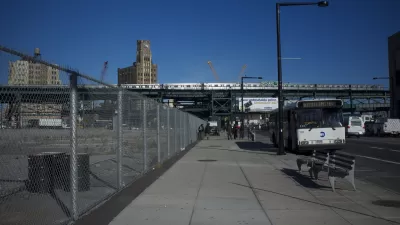In light of the resignation of APTA's president following the withdrawal of the New York Metropolitan Transportation Authority, the Transit Center offers its recommendations for reforming the national transit advocacy organization.

"APTA President and CEO Michael Melaniphy resigned late last month following news that New York’s Metropolitan Transportation Authority [MTA]—which carries 35 percent of the country’s transit riders—was withdrawing from the industry association," writes the TransitCenter.
In the [7-page] letter [PDF] announcing the agency’s decision..., MTA President Tom Prendergast implied that transit agencies in other large cities shared these sentiments. Prendergast described the agency’s “collective dissatisfaction with various aspects of APTA,” including the organization’s governance structure, its excessive membership dues, and Melaniphy’s annual compensation of nearly $900,000. [More reasons posted here].
TransitCenter, a New York City-based transportation research, advocacy and funding organization, views the vacancy as "an opportunity for APTA to move decisively in a new strategic direction."
The case for transit is stronger than ever, between the need to combat climate change through our transportation habits, the decline in driver’s license possession among young people, increased scrutiny of highway-building, and the prominence of socioeconomic inequality as a political issue.
Among TransitCenter's recommendations:
- Widen its leadership to "include advocates with expertise in poverty reduction, urban planning, and housing."
- Become less federally oriented (the group is based in D.C.) and more locally focused, e.g., "ensuring its members are effective advocates against auto-centric development policies."
Among the more controversial recommendations is to deal openly with what Planetizen called "half-baked" rail projects:
It’s hard for a membership-based organization to tell any of its members that they have an ugly baby. But let’s face it: some transit agencies propose (and build) projects that are functionally useless, bad value for money, or just inherently flawed.
State and federal leaders often hesitate to criticize local transit boondoggles for fear of jeopardizing a ribbon-cutting. That’s why APTA is in a uniquely powerful position to educate local officials about transit planning from the ground up, encouraging them to ask what ends they seek to achieve with transit rather than what a particular project should look like.
Finally, TransitCenter recommends that APTA align itself more with "biking and walking advocacy groups" and less with the "highway lobby."
Click here for past posts on TransitCenter.
Hat tip to Martine Powers of POLITICO Morning Transportation.
FULL STORY: The APTA Transit Needs

Maui's Vacation Rental Debate Turns Ugly
Verbal attacks, misinformation campaigns and fistfights plague a high-stakes debate to convert thousands of vacation rentals into long-term housing.

Planetizen Federal Action Tracker
A weekly monitor of how Trump’s orders and actions are impacting planners and planning in America.

Chicago’s Ghost Rails
Just beneath the surface of the modern city lie the remnants of its expansive early 20th-century streetcar system.

Bend, Oregon Zoning Reforms Prioritize Small-Scale Housing
The city altered its zoning code to allow multi-family housing and eliminated parking mandates citywide.

Amtrak Cutting Jobs, Funding to High-Speed Rail
The agency plans to cut 10 percent of its workforce and has confirmed it will not fund new high-speed rail projects.

LA Denies Basic Services to Unhoused Residents
The city has repeatedly failed to respond to requests for trash pickup at encampment sites, and eliminated a program that provided mobile showers and toilets.
Urban Design for Planners 1: Software Tools
This six-course series explores essential urban design concepts using open source software and equips planners with the tools they need to participate fully in the urban design process.
Planning for Universal Design
Learn the tools for implementing Universal Design in planning regulations.
planning NEXT
Appalachian Highlands Housing Partners
Mpact (founded as Rail~Volution)
City of Camden Redevelopment Agency
City of Astoria
City of Portland
City of Laramie




























